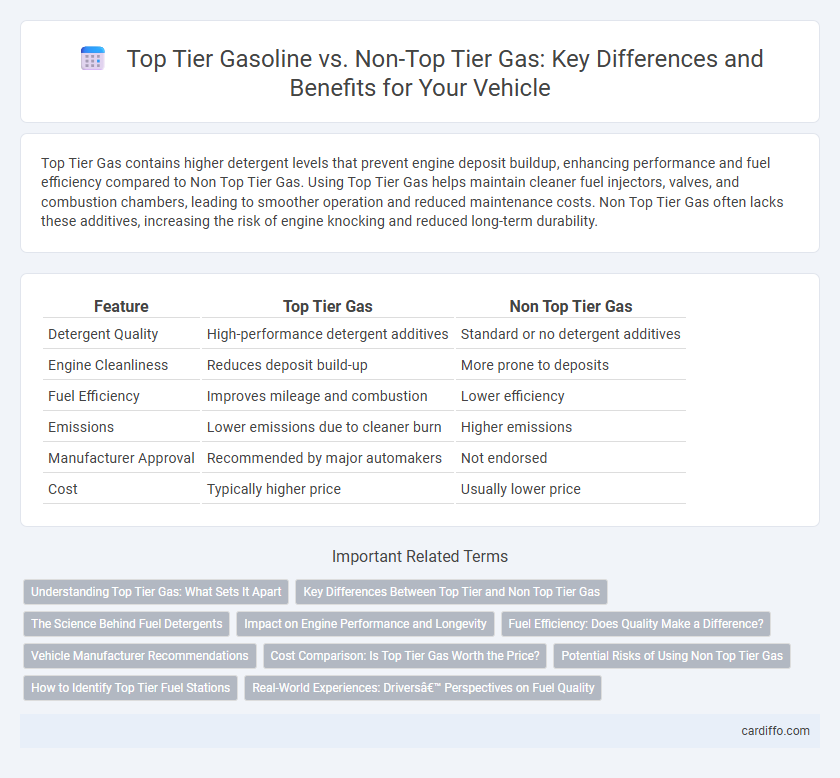Top Tier Gas contains higher detergent levels that prevent engine deposit buildup, enhancing performance and fuel efficiency compared to Non Top Tier Gas. Using Top Tier Gas helps maintain cleaner fuel injectors, valves, and combustion chambers, leading to smoother operation and reduced maintenance costs. Non Top Tier Gas often lacks these additives, increasing the risk of engine knocking and reduced long-term durability.
Table of Comparison
| Feature | Top Tier Gas | Non Top Tier Gas |
|---|---|---|
| Detergent Quality | High-performance detergent additives | Standard or no detergent additives |
| Engine Cleanliness | Reduces deposit build-up | More prone to deposits |
| Fuel Efficiency | Improves mileage and combustion | Lower efficiency |
| Emissions | Lower emissions due to cleaner burn | Higher emissions |
| Manufacturer Approval | Recommended by major automakers | Not endorsed |
| Cost | Typically higher price | Usually lower price |
Understanding Top Tier Gas: What Sets It Apart
Top Tier Gas is gasoline that meets enhanced performance standards established by major automakers to reduce engine deposits and improve fuel economy. Unlike Non Top Tier Gas, it contains higher quality detergents that keep fuel injectors and intake valves cleaner, preventing buildup that can impair engine performance. Choosing Top Tier Gas can lead to better engine longevity, smoother operation, and lower emissions over time.
Key Differences Between Top Tier and Non Top Tier Gas
Top Tier gas contains higher levels of detergents and additives designed to prevent engine deposits and improve fuel efficiency, while non Top Tier gas often lacks these enhanced cleaning properties. Vehicles using Top Tier fuel typically experience fewer engine problems, reduced emissions, and better long-term performance compared to those using non Top Tier gas. The Environmental Protection Agency (EPA) and major automakers endorse Top Tier gasoline to meet strict standards for fuel quality and engine protection.
The Science Behind Fuel Detergents
Top Tier Gas incorporates advanced detergent additives designed to prevent deposit buildup on critical engine components such as fuel injectors and intake valves, enhancing combustion efficiency and reducing emissions. Non Top Tier Gas often contains lower-quality detergents or none at all, leading to increased engine deposits that can degrade performance and fuel economy over time. Scientific studies indicate that maintaining cleaner engine parts with Top Tier Gas improves long-term engine durability and reduces costly maintenance.
Impact on Engine Performance and Longevity
Top Tier gasoline contains higher levels of detergent additives that effectively reduce engine deposits, improving fuel injector and valve cleanliness. Clean fuel injectors enhance combustion efficiency, leading to smoother engine performance and reduced emissions compared to non-Top Tier gas. Consistent use of Top Tier gas helps maintain engine longevity by preventing buildup that can cause knocking, rough idling, and costly repairs over time.
Fuel Efficiency: Does Quality Make a Difference?
Top Tier gasoline contains higher-quality detergents and additives that prevent engine deposits, leading to more efficient fuel combustion and improved mileage compared to non-Top Tier gas. Studies show vehicles using Top Tier gas experience cleaner fuel injectors and intake valves, which can enhance fuel efficiency by up to 5%. Choosing Top Tier fuel supports optimal engine performance and reduces long-term maintenance costs related to fuel system build-up.
Vehicle Manufacturer Recommendations
Vehicle manufacturers recommend Top Tier Gas for its higher detergent standards that prevent harmful engine deposits, ensuring optimal fuel system performance and longevity. Non Top Tier Gas lacks these stringent detergent levels, potentially leading to decreased fuel efficiency and increased engine maintenance costs over time. Using Top Tier-rated fuels supports manufacturers' warranty requirements and helps maintain engine cleanliness aligned with original design specifications.
Cost Comparison: Is Top Tier Gas Worth the Price?
Top Tier gas typically costs 10-15 cents more per gallon than non-Top Tier gas, but it includes higher detergent additives that significantly reduce engine deposits and improve fuel efficiency. Studies show vehicles using Top Tier fuel maintain better performance and lower maintenance costs over time, potentially offsetting the initial price difference. Choosing Top Tier gas can extend engine life and reduce the likelihood of costly repairs, making it a cost-effective option for long-term vehicle care.
Potential Risks of Using Non Top Tier Gas
Non Top Tier gas lacks the detergent additives required to prevent engine deposits, which can lead to reduced fuel efficiency and increased emissions over time. Using Non Top Tier gas increases the risk of carbon buildup on critical engine components such as intake valves and fuel injectors, potentially causing spark plug fouling and engine knocking. Long-term use may result in costly repairs and degraded engine performance compared to fuel certified as Top Tier.
How to Identify Top Tier Fuel Stations
Top Tier gas stations can be identified by checking the official Top Tier certification logo displayed at the pump or on the station's signage, ensuring the fuel contains higher detergent additives that prevent engine deposits. The list of Top Tier certified brands is available on the Top Tier website, providing a reliable reference for drivers seeking quality fuel. Opting for Top Tier gasoline helps improve engine performance and reduces maintenance costs over time.
Real-World Experiences: Drivers’ Perspectives on Fuel Quality
Top Tier Gas consistently delivers enhanced engine performance and cleaner combustion by containing higher detergent levels than Non Top Tier Gas, reducing carbon deposits and improving fuel economy according to numerous driver reports. Many drivers notice fewer engine knocks and smoother acceleration when using Top Tier fuels, attributing these benefits to superior additive packages that protect vital engine components. Real-world feedback highlights Top Tier Gas as a preferred choice for maintaining long-term engine health and optimizing vehicle reliability compared to standard gasoline options.
Top Tier Gas vs Non Top Tier Gas Infographic

 cardiffo.com
cardiffo.com